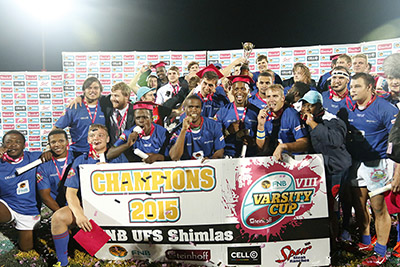
Photo: Johan Roux
Spotlight Photo: Spektor Photography |
Photo gallery
The UFS Shimlas rugby team made history on Monday 13 April 2015 when they won their first ever Varsity Cup tournament, beating North-West University (NWU) Pukke 63-33 in the final.
Not only did Shimlas make history by winning their first-ever tournament title since the inaugural tournament in 2008, but they did not lose a single game in the 2015 Varsity Cup, thus claiming the cup in front of their home crowd at Shimla Park in Bloemfontein.
Shimlas outscored their traditional intervarsity rivals with nine tries to four. Pukke put the first points on the scoreboard with a penalty kick. The home side started off slowly in the first half. However, Shimlas’ lock, Johan van der Hoogt, did score the first try of the match followed by flyhalf and player that rocks, Niel Marais’s successful conversion kick. Yet, the men from the North-West retaliated full force for the greater part of the first half and, two tries later, had a 18-8 lead over the UFS team.
Shortly after the first strategy break, Shimlas No.8, Niell Jordaan, crossed the try line following a driving maul, but the visitors received another penalty and succeeded with the kick at goal. The last ten minutes before half time saw Shimlas taking advantage, with the Pukke skipper being sent to the sin bin. Wing Maphutha Dolo hit a gap in NWU’s defense, and scored the try that put Shimlas in the lead again. Not long after, Marais sparked in making a play, offloading to flank Daniel Maartens to score a final try before half time, securing a 26-20 lead.
The second half had not been in play too long when the home side crossed the try line again, scoring their fifth try. Marais was again central in creating the play that saw Shimlas outside centre, Nico Lee, putting the points on the board.
NWU fought back again, scoring a pushover try from a scrum. But Shimlas would not give up the lead again, and a well-timed pass from Marais had Lee crossing the line for his second try.
More Shimlas tries piled up from Marais, Dolo, and Maartens, leaving the Potchefstroom side behind 63-25, giving them little opportunity to score again. One desperate consolation try by Pukke in the final seconds did manage to close the gap on the scoreboard, but it was not nearly enough to snatch the title from the hungry and undefeated Shimlas.
FNB Player that Rocks: Niel Marais
Shimlas point scorers:
Tries: Johan van der Hoogt, Niell Jordaan, Maphutha Dolo (2), Daniel Maartens (2), Nico Lee (2), Niel Marais
Conversions: Niel Marais (6)